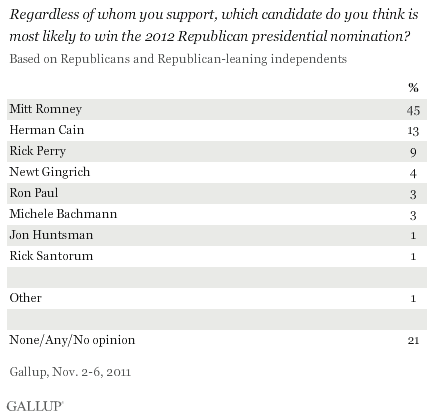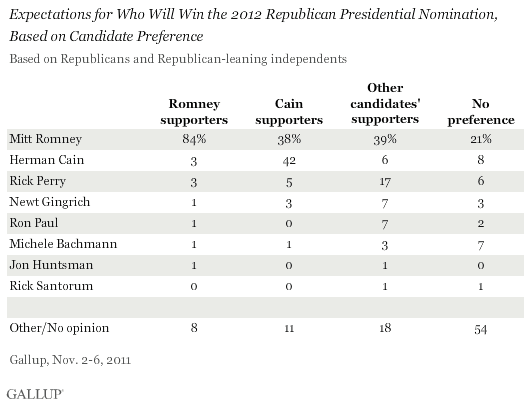PRINCETON, NJ -- Republicans are most likely to predict that Mitt Romney will be their party's 2012 presidential nominee. The 45% who believe Romney will win the nomination exceeds the combined 35% who think any other candidate will win, including 13% who say Herman Cain and 9% who say Rick Perry.

These results are based on a Nov. 2-6 Gallup poll, conducted after sexual harassment allegations against Cain surfaced. The poll shows Romney and Cain tying at 21% as the candidate Republicans say they are most likely to support for the nomination. Thus, Republicans are more than twice as likely to believe Romney will win the nomination as to prefer he be the nominee at this time.
Romney supporters overwhelmingly believe he will win. But Cain supporters are about as likely to believe Romney will win as to believe Cain will. Those who support other candidates, or who have no preference, are also inclined to believe Romney will emerge as the winner.

Notably, Tea Party supporters, who currently show a slight preference for Cain (26%) over Romney (19%), are as likely (47%) as Tea Party nonsupporters (47%) to believe Romney will eventually win the nomination. Nonsupporters prefer Romney to Cain by 2 to 1, 28% to 14%.
One reason Republicans may be most likely to believe Romney will win is because it appears at this point he would be the strongest challenger to President Obama. In Gallup's August, September, and October presidential trial heats matching various candidates against Obama, Romney has fared no worse, and in some cases better, than his GOP rivals.
Republicans, though, in the new poll remain divided as to whether they would vote strategically or for the candidate whose positions best match theirs on issues they care about. Forty-seven percent say they would opt for the candidate with the best chance of beating Obama, while 45% would prefer the candidate who agrees with them on the issues. The current results on this question are similar to what Gallup found earlier this year.
Republicans who are more inclined to vote for the candidate with the best chance of beating Obama are slightly more likely to believe Romney will win the GOP nomination, 52%, than are those who would support the candidate who agrees with them on issues, 42%.
Implications
Romney is generally acknowledged as a front-runner, if not the leading candidate, based on nomination preference polls as well as his fundraising totals and prior experience in running for president. But Romney remains a fairly weak front-runner in three respects.
First, in most prior GOP nominating contests, the front-running candidate had a large lead over the rest of the field, whereas Romney has had at best only slight leads over his rivals.
Second, the percentage of Republicans who prefer Romney as the party's nominee has failed to grow over the course of the campaign, even as prominent challengers such as Mike Huckabee declined to run and as some of Romney's current rivals, including Michele Bachmann and Rick Perry, gained in the polls earlier in the campaign only to lose much of their support as they became better known.
Third, his lower Positive Intensity Scores indicate he is not generating a lot of enthusiasm among Republicans.
However, the belief that Romney is most likely to win the nomination could be a strong factor in helping Republican voters decide on the candidate they will support for the nomination. If he is able to do well in the early caucuses and primaries, the belief that he is the likely nominee will only be strengthened, and may in turn help to increase Republican enthusiasm for the former Massachusetts governor. On the other hand, if he performs poorly in the early contests, Republicans may come to view other candidates as more viable, which could weaken Romney's positioning.
Sign up to get Election 2012 news stories from Gallup as soon as they are published.
Survey Methods
Results for this Gallup poll are based on telephone interviews conducted Nov. 2-6, 2011, on the Gallup Daily tracking survey, with a random sample of 1,054 Republicans and Republican-leaning independents, aged 18 and older, living in all 50 U.S. states and the District of Columbia.
For results based on the total sample of Republicans, one can say with 95% confidence that the maximum margin of sampling error is ±4 percentage points.
Interviews are conducted with respondents on landline telephones and cellular phones, with interviews conducted in Spanish for respondents who are primarily Spanish-speaking. Each sample includes a minimum quota of 400 cell phone respondents and 600 landline respondents per 1,000 national adults, with additional minimum quotas among landline respondents by region. Landline telephone numbers are chosen at random among listed telephone numbers. Cell phone numbers are selected using random-digit-dial methods. Landline respondents are chosen at random within each household on the basis of which member had the most recent birthday.
Samples are weighted by gender, age, race, Hispanic ethnicity, education, region, adults in the household, and phone status (cell phone only/landline only/both, cell phone mostly, and having an unlisted landline number). Demographic weighting targets are based on the March 2010 Current Population Survey figures for the aged 18 and older non-institutionalized population living in U.S. telephone households. All reported margins of sampling error include the computed design effects for weighting and sample design.
The questions reported here were asked of a random half-sample of Republican respondents for five nights on the Gallup Daily tracking survey.
In addition to sampling error, question wording and practical difficulties in conducting surveys can introduce error or bias into the findings of public opinion polls.
View methodology, full question results, and trend data.
For more details on Gallup's polling methodology, visit www.gallup.com.